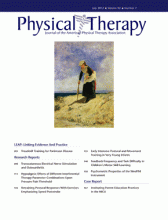Abstract
Background Burns occur frequently in young children. To date, insufficient data are available to fully describe the functional consequences of burns. In different patient populations and countries, the WeeFIM instrument (“WeeFIM”) often is used to measure functional independence in children.
Objective The purpose of this study was to examine the psychometric properties of the WeeFIM instrument for use in Dutch burn centers.
Design This was an observational study.
Methods The WeeFIM instrument was translated into Dutch. All clinicians who rated the children with the instrument passed the WeeFIM credentialing examination. They scored consecutive children (n=134) aged 6 months to 16 years admitted to Dutch burn centers with acute burns during a 1-year period at 2 to 3 weeks, 3 months, and 6 months postburn. To examine reliability, 2 raters scored a child at the same time (n=52, 9 raters) or the same rater scored a child twice within 1 week (n=7, 3 raters).
Results After a few weeks, the WeeFIM assessment could be administered in less than 15 minutes. Clinicians thought it was difficult to rate a child aged between 2 and 4 years as well as the cognitive items. Nevertheless, reliability was good (all intraclass correlation coefficients [1,1] were above .80). The standard error of measurement was 3.7.
Limitations Intrarater reliability was based on only 7 test-retest measurements. Within our clinical setting, it turned out to be difficult to schedule the same rater and patient twice in one week for repeated assessments. Assessments for interrater reliability, on the other hand, worked out well.
Conclusions The WeeFIM instrument is a feasible and reliable instrument for use in children with burns. For evaluation of a child's individual progress, at least 11 points' improvement should be observed to state that a child has significantly improved.
Footnotes
Dr Niemeijer, Dr Reinders-Messelink, and Dr Nieuwenhuis provided concept/idea/research design and writing. Ms Disseldorp provided data collection. Dr Niemeijer provided data analysis. Dr Niemeijer and Dr Nieuwenhuis provided project management and participants. Dr Nieuwenhuis provided fund procurement and facilities/equipment. Dr Reinders-Messelink, Ms Disseldorp, and Dr Nieuwenhuis provided consultation (including review of manuscript before submission).
The authors thank the following people for their dedication to this study: Margriet van Baar, Anita Boekelaar, Ina Boerma, Anneke Dumans, Helma Hofland, Paula Gieles, Ina van Ingen Schenau, Hennie Schouten, Anneke van de Steenoven, Kitty Stoker, Miranda Venema, Martijn van der Wal, and Jan-Kees Zuiker. They also thank the members of the Centre for Functional Assessment Research of the Uniform Data System for Medical Rehabilitation (UDSmr), State University of New York at Buffalo, for making it possible to use the WeeFIM instrument in the Netherlands and for their feedback.
This study was approved by the medical ethical committees of the Maasstad Hospital in Rotterdam, the Red Cross Hospital in Beverwijk, and the Martini Hospital in Groningen.
This study was supported by a grant from the Dutch Burns Foundation.
The use of the WeeFIM instrument to collect data for this research study was authorized and conducted in accordance with the terms of a special purpose license granted to the licensee by the Uniform Data System for Medical Rehabilitation (UDSmr), a division of U. B. Foundation Activities Inc. The licensee has not been trained by UDSmr in the use of the WeeFIM instrument, and the patient data collected during the course of this research study have not been submitted to or processed by UDSmr. No implication is intended that such data have been or will be subjected to UDSmr's standard data processing procedures or that the data are otherwise comparable to data processed by UDSmr. WeeFIM and FIM are trademarks of UDSmr.
- Received November 17, 2011.
- Accepted March 21, 2012.












